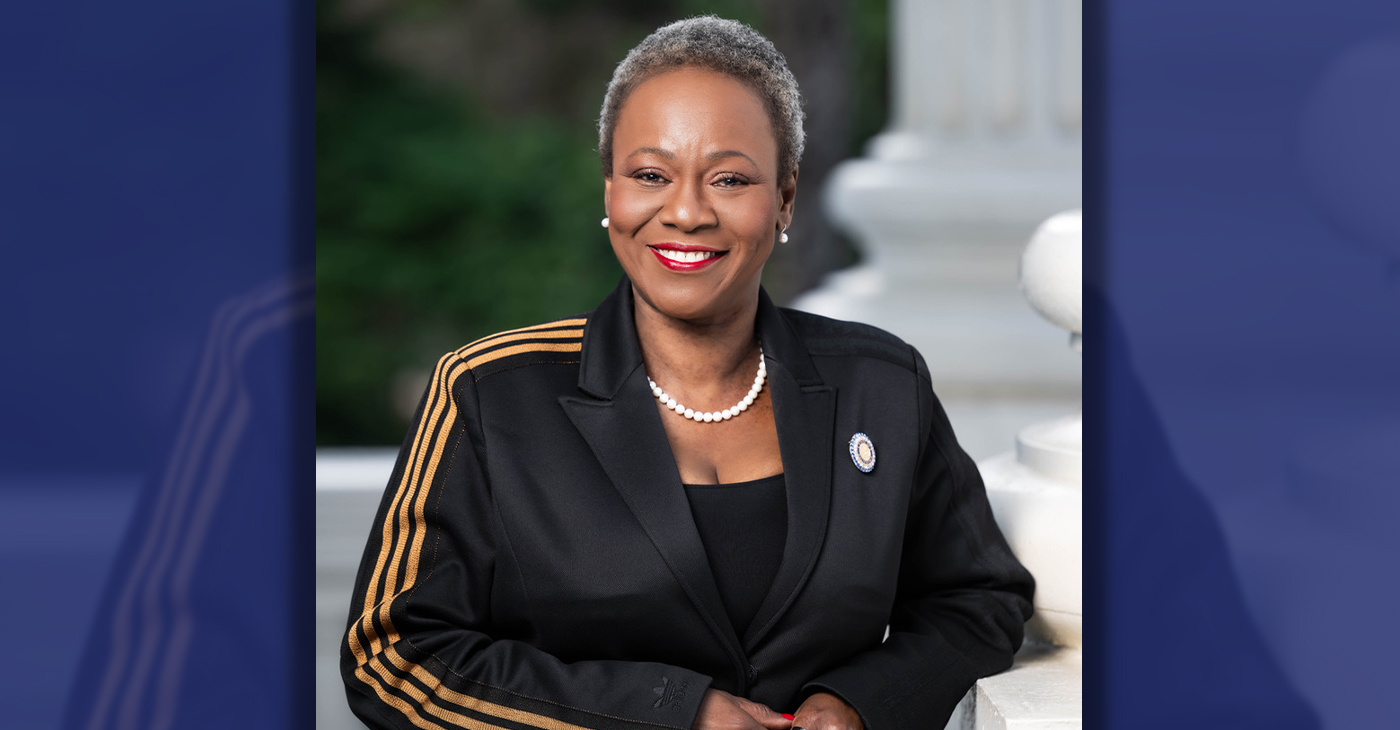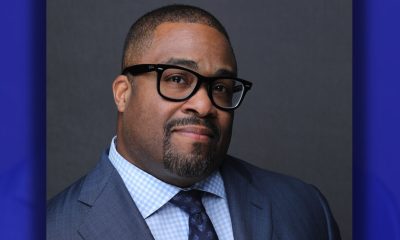Government
Jones Chosen as New Md. House Speaker
WASHINGTON INFORMER — Maryland Del. Adrienne Jones of Baltimore County was unanimously chosen Wednesday as the state’s new House speaker during a special session among her colleagues. Jones, who served as speaker pro tem to organize House sessions when the late House Speaker Michael Busch wasn’t in attendance, becomes the state’s first woman and African American to hold the position.
By William J. Ford
ANNAPOLIS — Maryland Del. Adrienne Jones of Baltimore County was unanimously chosen Wednesday as the state’s new House speaker during a special session among her colleagues.
Jones, who served as speaker pro tem to organize House sessions when the late House Speaker Michael Busch wasn’t in attendance, becomes the state’s first woman and African American to hold the position.
“I’m probably going to take a deep breath,” Jones, 64, said. “I know the Baltimore region best, [but] other areas [will] not be neglected because I’m a visual person. I like to go out in areas. … I’m visual.”
According to the legislation handbook, some of the duties of the speaker includes the appointment of committee leadership, assigns bills to committee and decides all points of order. However, the speaker must also maneuver political posturing which Busch received praise for from his Democratic colleagues and Republican members.
Before Jones received the 139 unanimous votes on the House floor, the House Democratic Caucus deliberated for more than four hours while considering two additional delegates, Maggie McIntosh of Baltimore City and Dereck E. Davis of Prince George’s County, for the position.
All three lawmakers have served in the House for more than 20 years.
McIntosh, a gay white woman, and Davis who’s Black, chair two prominent committees in the House. McIntosh leads Appropriations and Davis heads Economic Matters.
Either would have made history if selected as House speaker, as only white men have held the position.
Busch, 72, had held the position since 2003 and served as the longest House speaker in state history. He died April 7, one day before the last day of the legislative session, of pneumonia following complications from a 2017 liver transplant.
According to those familiar with Wednesday’s discussions, McIntosh received 50 votes and Davis 48.
The House Republicans voted as a bloc during its session, with all 42 votes for Davis.
The winner needed 71 votes to secure the position.
To ensure caucus unity and avoid the need for GOP votes, Jones was backed by all 98 Democrats, though more progressive members of the party sided with McIntosh.
“There were a number of people that wanted to support Chairman Davis … [and] join in with the Republican Caucus,” said a teary-eyed McIntosh minutes after the Democratic Caucus meeting. “I basically said, ‘We need to stay this room until we find someone who gets 71 votes. So we stayed in this room and did it. It was the best debate I ever heard. I’m proud.”
Davis, 51, praised Jones, who stepped out of the speaker race Friday to support him.
“‘House of Cards’ doesn’t have anything on us — talk about high drama,” Davis said from the House floor. “No one will ever forget the courage, the conviction and just the strength you showed those vital few weeks of this passed legislation session guiding us through … and performing admirably. [Less than] one week ago, you were willing to step aside for me and I’m honored to step aside for you now.”
House Minority Leader Del. Nic Kipke (R-Anne Arundel County) said Jones treats every member with respect.
“She’s not a partisan person, which we really appreciate, being the minority in Maryland like Republicans are,” he said. “We look forward to working with her to solving the big problems that are in our in the state. We’re excited about her nomination and election today.”
Senate President Thomas V. Mike Miller Jr. also congratulated Jones.
“Del. Jones has been a key House leader on issues including education, health and environment for years and is a natural successor to Speaker Busch,” Miller said in a statement. “I congratulate her and look forward to continuing to partner with her in the future.”
This article originally appeared in the Washington Informer.
California Black Media
Yahushua’s Law: Senate Advances Bill to Protect Students from Extreme Weather
In a significant move towards student safety, the California Senate Education Committee passed Senate Bill (SB) 1248, also known as Yahushua’s Law, on April 3. The bill is named in memory of Yahushua Robinson, a 12-year-old student from Lake Elsinore, who tragically died due to a heat-related illness during a physical education class in 2023. It is a pioneering effort to prevent similar incidents in the future.

By California Black Media
In a significant move towards student safety, the California Senate Education Committee passed Senate Bill (SB) 1248, also known as Yahushua’s Law, on April 3.
The bill is named in memory of Yahushua Robinson, a 12-year-old student from Lake Elsinore, who tragically died due to a heat-related illness during a physical education class in 2023. It is a pioneering effort to prevent similar incidents in the future.
Authored by Senator Melissa Hurtado (D-Bakersfield) and co-authored by Assemblymember Akilah Weber, M.D. (D-La Mesa), SB 1248 directs the California Department of Education to develop comprehensive guidelines for schools regarding student activity during all extreme weather conditions.
“No student should ever lose their life on campus to extreme weather when we can take steps to protect them by preparing statewide plans to minimize exposure to the most harmful elements of exposure,” Hurtado said after introducing SB 1248.
The bill stipulates that schools must implement safety measures which include monitoring weather forecasts, postponing or relocating outdoor activities during hazardous conditions, and ensuring students have proper hydration and access to shade. It also requires schools to establish clear communication plans to keep parents, teachers, and students informed about potential weather hazards.
Supporters of the bill include the Robinson family, advocate Christina Laster, Bold Enterprises LLC, California Black Women’s Collective Empowerment Institute, Familias Empoderadas del Valle Central National Action Network, The Black Student Advocate, and the Ventura County Alumnae Chapter of Delta Sigma Theta Sorority.
Thanking Hurtado for introducing this crucial legislation, Weber said, “The story of Yahushua Robinson last year was heartbreaking. We have protections for farm workers and other industries in the case of extreme weather, now climate change is forcing us to also extend similar protections to students at school.”
City Government
LAO Releases Report on Racial and Ethnic Disparities in California Child Welfare System
Racial inequalities in California’s child welfare system disproportionately impact poor Black and Native American children, according to a report released April 3 by the nonpartisan Legislative Analyst’s Office (LAO). The report, which was presented to the Assembly Subcommittee No. 2 on Human Services — chaired by Assemblymember Corey Jackson (D-Moreno Valley) — states that the proportion of low-income Black and Native American children in foster care is four times larger than other racial and ethnic groups in the state.

Racial inequalities in California’s child welfare system disproportionately impact poor Black and Native American children, according to a report released April 3 by the nonpartisan Legislative Analyst’s Office (LAO).
The report, which was presented to the Assembly Subcommittee No. 2 on Human Services — chaired by Assemblymember Corey Jackson (D-Moreno Valley) — states that the proportion of low-income Black and Native American children in foster care is four times larger than other racial and ethnic groups in the state. Half of the children from each racial group has experienced some level of child welfare involvement before reaching legal age.
Jackson is a member of the California Legislative Black Caucus.
“Racial and ethnic disproportionality and disparities are present within initial allegations and persist at all levels of the system — becoming the most pronounced for youth in care,” the report states.
The disparities have persisted over the last decade across the state, the LAO found, adding that Black children living in poverty are more likely to enter foster care. State data shows that there is a correlation between poverty and foster placement in each county.
“Throughout all levels of the child welfare system, families experiencing poverty are more likely to come to the attention of and be impacted by the child welfare system,” stated the report.
Overall, the report revealed that more than half of the families affected by the state child welfare system earn $1,000 per month, significantly less than the national average of $5,000 a month.
The financial disparities highlighted in the LAO report align with existing research indicating that poverty is among the main factors contributing to the likelihood of child maltreatment. State anti-poverty programs include cash aid, childcare subsidies, supportive housing, and nutrition assistance.
California Black Media
Commentary: Finding the Right Balance — Addressing Organized Retail Theft While Upholding Civil Liberties
Organized retail theft is a significant issue that impacts both consumers and businesses. While it is crucial to address theft and protect businesses from losses, we should also be mindful of safeguarding individuals’ constitutional rights, particularly the right to due process. AB 1990 by Assemblymember Wendy Carrillo, also known as the STOP Act, raises concerns about the balance between addressing theft effectively and ensuring civil liberties are upheld.

By Assemblymember Tina McKinnor | Special to California Black Media Partners
Organized retail theft is a significant issue that impacts both consumers and businesses. While it is crucial to address theft and protect businesses from losses, we should also be mindful of safeguarding individuals’ constitutional rights, particularly the right to due process.
AB 1990 by Assemblymember Wendy Carrillo, also known as the STOP Act, raises concerns about the balance between addressing theft effectively and ensuring civil liberties are upheld. This bill allows law enforcement officers to make warrantless arrests for shoplifting offenses not witnessed by the officer, as long as there is reasonable cause to believe the individual committed the crime. This bill has a dangerous potential for overreach and infringes on civil liberties, particularly the right to due process.
While the stated intention behind the STOP Act is to combat organized retail theft and protect businesses, there are valid concerns that this bill is an overreach and that existing law works, if properly enforced by our partners in law enforcement. A petty theft involving property stolen valued at $950 or less may be charged as a felony or misdemeanor (called a wobbler) if the offender has the following prior convictions: 1) at least on prior petty or theft-related conviction for which a term of imprisonment was served, and 2) a prior conviction for a serious or violent offense, for any registerable sex offense, or for embezzlement from a dependent adult or anyone over the age of 65. A misdemeanor can result in a sentence of up to one year in jail, whereas a felon can mean incarceration for 16 months, two years or three years. Let’s look at shoplifting in California. It occurs when a suspect enters a store, while that establishment is open, intending to steal property worth less than $950. The crime is considered a misdemeanor, punishable by up to six months in the county jail.
Granting officers the authority to arrest individuals based on reasonable cause, without witnessing the crime firsthand, can lead to negative consequences and possible violations of individual rights. Probable cause is the legal standard by which police authorities have reason to obtain a warrant for the arrest of a suspected criminal and for the courts to issue a search warrant. A grand jury uses the probable cause standard to determine whether or not to issue a criminal indictment. The principle behind the probable cause standard is to limit the power of authorities to conduct unlawful search and seizure of a person or its property, and to promote formal, forensic procedures for gathering lawful evidence for the prosecution of the arrested criminal. Reasonable cause does not require any of this due process and only requires that an officer reasonably believes that a crime has been committed. It is essential to find a middle ground that effectively addresses organized retail theft without compromising the fundamental rights of individuals.
California’s current laws, including the use of witness statements and surveillance evidence are sufficient for addressing suspected shoplifting and organized retail theft. California Attorney General Rob Bonta recently prosecuted Michelle Mack, a suspected organized smash and grab ringleader who paid twelve women to travel around California and commit over $8 million in retail theft at 21 different stores. AG Bonta used California’s current laws to have the suspect arrested and brought to justice.
The State of California is also making significant investments to address retail theft. Just this past year California invested an additional $267 million to combat organized retail theft. It has been less than a year and our law enforcement partners should have the opportunity to address this recent spike in retail theft crime.
Los Angeles County recently applied for and received a grant for the State of California for $15.6 million dollars to address retail theft enforcement. LA District Attorney George Gascon also recently formed an organized retail task force that partners with LA County Sheriff’s Department, Glendale, Beverly Hills, Burbank, Torrance and Santa Monica Police Departments to integrate their response to retail theft across the region. These collaborative efforts, such as those seen in initiatives like the organized retail task force in LA County, demonstrate the importance of a united approach to tackling theft while maintaining a balance between enforcement and civil liberties.
As we move forward, it is essential for policymakers, law enforcement agencies, businesses and communities to work together in finding solutions that effectively address organized retail theft without encroaching on individual rights. Ongoing evaluation and a commitment to thoughtful consideration will be crucial in navigating this challenge and fostering a safe and prosperous environment for all. Balancing the scales of justice to protect businesses while upholding civil liberties demands a comprehensive and conscientious approach from all stakeholders involved.
I am confident we can find that balance.
About the Author
Assemblymember Tina McKinnor (D-Inglewood) represents the 61st District in Los Angeles County, which includes parts of the South Bay, Inglewood, Hawthorne and Lawndale.
-

 Activism4 weeks ago
Activism4 weeks agoOakland Post: Week of March 20 – 26, 2024
-

 #NNPA BlackPress3 weeks ago
#NNPA BlackPress3 weeks agoCOMMENTARY: D.C. Crime Bill Fails to Address Root Causes of Violence and Incarceration
-

 #NNPA BlackPress3 weeks ago
#NNPA BlackPress3 weeks agoMayor, City Council President React to May 31 Closing of Birmingham-Southern College
-

 #NNPA BlackPress3 weeks ago
#NNPA BlackPress3 weeks agoFrom Raids to Revelations: The Dark Turn in Sean ‘Diddy’ Combs’ Saga
-

 #NNPA BlackPress3 weeks ago
#NNPA BlackPress3 weeks agoCOMMENTARY: Lady Day and The Lights!
-

 #NNPA BlackPress3 weeks ago
#NNPA BlackPress3 weeks agoBaltimore Key Bridge Catastrophe: A City’s Heartbreak and a Nation’s Alarm
-

 #NNPA BlackPress3 weeks ago
#NNPA BlackPress3 weeks agoBaltimore’s Key Bridge Struck by Ship, Collapses into Water
-

 Activism3 weeks ago
Activism3 weeks agoOakland Post: Week of March 27 – April 2, 2024
















































